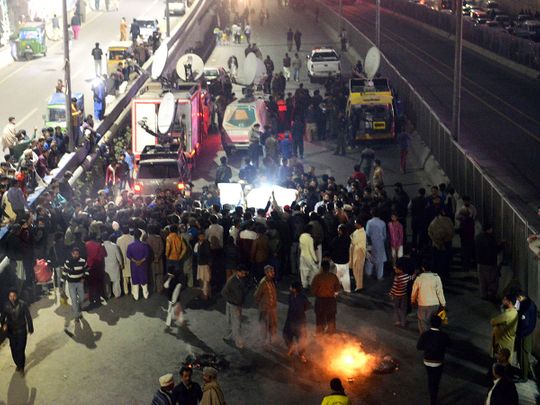
Dubai: The ‘murder’ of four people in Sahiwal district in Punjab in a so-called police encounter has once again drawn attention towards the menace of extrajudicial killings in Pakistan.
Police forces in South Asian nations are notorious for their high-handedness, torture in custody and killings in fake encounters – the hallmarks of the colonial police force. Unfortunately, the Police Order of 1861, the British era police rule, still remains enforced in Pakistan as only some cosmetic changes have been introduced over the last few years. Common people still fear police in Pakistan instead of feeling protected and safe whenever they see them anywhere close to them.
What happened on January 19, 2019
On January 19, in what appears to be another incident of extrajudicial killing, police ‘murdered’ four people, including a husband and his wife and their teenage daughter in Sahiwal declaring them to be terrorists.
Mohammad Khalil, a resident of Lahore, his wife Nabeela, their 13-year-old daughter, Areeba, and their neighbour Zeeshan, were killed as police opened fire on their car near a toll plaza on the Lahore-Sahiwal highway. Three of their children survived though one boy received bullet wounds. Relatives told the media that they were killed by police while they were on their way to a wedding in Burewala.
The incident sent shock waves across the country, and police, the administration and even Prime Minister Imran Khan came under fire from the media. Though Prime Minister Imran Khan has pledged thorough investigations into the incident, three children who survived will never be able to see their parents who were killed in front of their eyes.
An excuse to kill?
The ‘war against terrorism’ has made things worse in Pakistan as it provides yet another excuse to police to stage extrajudicial killings with further impunity. In this particular case, officials of the Counter-Terrorism Department (CTD) said those killed in the shooting were terrorists belonging to a known militant organization: Daesh.
But this does not give police the right to kill a family travelling with children. The ‘elite force’ could have adopted other measures to tackle the ‘so-called terrorists’ instead of blindly opening the fire on them.
Country-wide protests
Last year, the extra-judicial killing of a Pashtun boy Naqeebullah Mehsud in Karachi by police officials at the Counter Terrorism Department, triggered country-wide protests. Though police had cited Mehsud’s alleged links with Tehreek-i-Taliban Pakistan (TTP), it was never proved.
According to the Human Rights Commission of Pakistan, 2,108 men and seven women were killed in police encounters across Pakistan during 2015. Some 696 suspects were killed in Karachi alone. Punjab was even worse where 1,191 men and 3 women were killed in police encounters.
“An encounter killing occurs when the police justify the killing of a criminal suspect either as an act of self-defence or as a means of preventing suspects from fleeing arrest or escaping from custody … many are faked outright, and are not merely the use of excessive force but an extrajudicial execution”, adds the the Human Rights Commission of Pakistan.
In the fighting terror in Pakistan, anyone can be branded an alleged terrorist or a facilitator – a valid reason to kill in a police encounter.
Why does it happen?
For police, extrajudicial killings is an easy and quick way of bringing criminals to justice because they believe that otherwise they will get away and hardly get punished in the courts due to loop-holes in the judicial system. Overhauling of the criminal justice system should be done on a priority basis with checks and balances on police and security forces to prevent the killing of innocent people.
The Human Rights Report has also demanded that the government introduce effective systems to ensure police accountability and redress people's grievances. The government also needs to remove laws that increases the police's tendency towards impunity.








